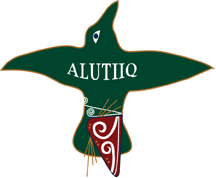 Niugneliyukut (We Are Niugneliyukut (We Are
Making New Words):
A Community Philosophy of
Language Revitalization
A Thesis
Presented to the
Faculty of the
University of Alaska Fairbanks
In Partial Fulfillment
of the Requirements for the Degree
DOCTOR OF PHILOSOPHY By
April Gale Laktonen Counceller, M.A.
Fairbanks, Alaska
December 2010
Dissertation (pdf
- 5.3 MB)
Abstract:
The Alutiiq language on Kodiak Island (Alaska) is severely threatened,
with only 37 resident speakers. The Alutiiq communities of Kodiak are
engaged in a multifaceted heritage revitalization movement, which includes
cultural education, revitalization of arts, and language revitalization.
The language revitalization effort includes education, materials development,
documentation, and terminology development (creation of new words) as
a means of making the language more viable. The Kodiak Alutiiq New Words
Council began in the fall of 2007. This language revitalization strategy
is new to the Alutiiq community, and little research has been done on
Alaska Native or Indigenous terminology development as a form of heritage
revitalization. There is a need to understand the New Words Council in
terms of its role in the wider language and heritage revitalization efforts,
as well as understanding the value of the council to its members.
The
Kodiak New Words Council is a contemporary heritage revitalization effort
that entails development of new Alutiiq terms, and is part of a broader social
movement to revitalize Alutiiq language and culture. Some past research on
cultural heritage revitalization movements in Indigenous communities have focused
on historical inaccuracies and ‘inventedness’ of new cultural forms,
rather than the value and meaning of these efforts to their participants. Critiques
of ‘invention’ scholarship counter that it denies Indigenous communities’ agency
and authority over their own cultural forms, and overlooks ongoing efforts
for justice, sovereignty and healing. This study focuses attention on the social
and historical context of heritage revitalization and its meaning to participants.
Benefits of the council go beyond the formal goal of developing new words to
modernize the language. Participants put great value on social benefits of
the New Words Council, such as empowerment, connection to culture and identity,
and healing. They further measure the success of the New Words Council in terms
of participation, commitment, and continuity. Ultimately, this language revitalization
effort is part of a broader effort of self- determination and community survival.
|